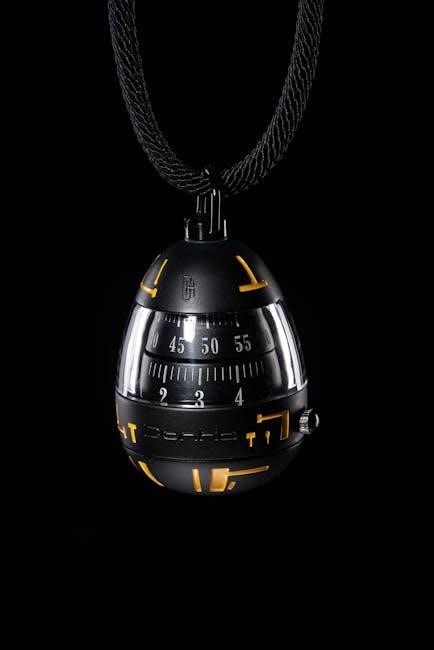Overview of the 7th Edition
The 7th edition of Theory and Design for Mechanical Measurements offers updated content, new practice problems, and enhanced digital resources for improved learning experiences.
1.1 Key Features of the Updated Edition
The 7th edition of Theory and Design for Mechanical Measurements introduces several key enhancements. It includes new practice problems and electronically accessible solutions, providing students with hands-on learning opportunities. The updated content focuses on test system modeling and uncertainty analysis, essential for modern mechanical measurements. Additionally, the edition offers dedicated Instructor Problems to facilitate course instruction. The textbook also emphasizes current technologies and their applications, ensuring relevance in today’s engineering landscape. Supplementary materials, such as PDF chapters and digital resources, are available, making the content more accessible. These features collectively enhance the learning experience, blending theoretical concepts with practical applications.
- New practice problems and solutions
- Updated content on test system modeling and uncertainty analysis
- Dedicated Instructor Problems
- Supplementary digital materials
1.2 Authors and Their Contributions
The 7th edition of Theory and Design for Mechanical Measurements is authored by Richard S. Figliola and Donald E. Beasley, both renowned experts in mechanical engineering. Figliola is celebrated for his contributions to measurement systems and uncertainty analysis, while Beasley brings extensive experience in mechanical design and thermodynamics. Their collaboration ensures a balanced approach, blending theoretical foundations with practical applications. The authors’ dedication to clarity and accessibility has made the textbook a cornerstone in engineering education. Their work emphasizes real-world relevance, preparing students for contemporary challenges in mechanical measurements. This edition reflects their commitment to advancing the field through updated methodologies and technologies;
- Renowned authors with expertise in mechanical engineering
- Combination of theoretical and practical insights
- Contributions to uncertainty analysis and design

Core Concepts in Mechanical Measurements
The text emphasizes test system modeling, uncertainty analysis, and data acquisition, providing a solid foundation for understanding mechanical measurements and their practical applications in engineering.
The 7th edition provides a comprehensive introduction to measurement systems, focusing on their fundamental components and applications. It covers sensors, data acquisition devices, and software tools essential for accurate measurements. The text emphasizes the importance of understanding how these systems integrate to ensure reliable data collection and analysis. Key concepts include calibration, signal conditioning, and noise reduction, which are critical for obtaining precise measurements. The edition also introduces modern techniques in data processing and visualization, enhancing the ability to interpret and apply measurement results effectively. By building a strong foundation in measurement systems, the book prepares readers to tackle complex challenges in mechanical engineering and related fields.

2.2 Uncertainty Analysis and Test Plan Design
The 7th edition emphasizes the importance of uncertainty analysis in ensuring the reliability of mechanical measurements. It provides detailed methodologies for quantifying and managing uncertainties in measurement systems. The text also focuses on the design of robust test plans, highlighting strategies for minimizing errors and optimizing data collection. By integrating cutting-edge techniques, the book equips readers with the tools to develop precise and repeatable measurement protocols. Practical examples and case studies illustrate how to apply uncertainty analysis and test plan design in real-world engineering scenarios, making it an invaluable resource for both students and professionals in the field of mechanical measurements.
Design Considerations for Mechanical Measurements
Design considerations focus on test system modeling, sensor selection, and system integration to ensure accuracy and reliability in mechanical measurements.
3.1 Sensor Selection and Application
Sensor selection is critical for ensuring accuracy and reliability in mechanical measurements. The 7th edition emphasizes factors like accuracy, range, and environmental compatibility when choosing sensors. It highlights modern sensor technologies, such as MEMS and smart sensors, which offer enhanced performance and integration capabilities. The text provides practical guidelines for selecting sensors based on specific measurement requirements, including temperature, pressure, and vibration; Additionally, it explores the application of sensors in various industrial settings, ensuring readers understand how to optimize sensor performance in real-world scenarios. The updated edition also includes case studies and examples to illustrate effective sensor integration into measurement systems.
3.2 Test System Modeling and Development
The 7th edition provides comprehensive insights into test system modeling and development, emphasizing the importance of accurate simulations and designs. It outlines methodologies for creating detailed models that replicate real-world conditions, ensuring precise measurement outcomes. The text covers advanced tools and software for system modeling, enabling engineers to predict and optimize system behavior. Practical examples illustrate how to integrate modeling with test plan design, enhancing the reliability of mechanical measurements. Additionally, the edition explores emerging trends in test system development, such as automated data acquisition and real-time analysis. These advancements are crucial for maintaining efficiency and accuracy in both industrial and research applications, making this section invaluable for modern engineers and students alike.

Applications in Modern Engineering
The 7th edition highlights the role of mechanical measurements in modern engineering, emphasizing their importance in industrial automation, aerospace, and biomedical engineering for precision and accuracy.
4.1 Industrial Uses of Mechanical Measurements
Mechanical measurements play a crucial role in industrial applications, ensuring precision and efficiency in manufacturing processes. The 7th edition emphasizes their significance in quality control, automation, and process optimization. Advanced techniques discussed in the text, such as uncertainty analysis and test system modeling, are widely applied in industries like aerospace and automotive manufacturing. The book provides practical insights into real-world challenges, enabling engineers to design and implement accurate measurement systems. By focusing on modern engineering practices, the edition bridges theoretical concepts with industrial applications, making it a valuable resource for professionals and students alike.
4.2 Emerging Trends in Measurement Technology
Emerging trends in measurement technology are reshaping the field, with advancements in digital transformation and the Internet of Things (IoT) enabling smarter, more connected systems. The integration of artificial intelligence (AI) and machine learning into measurement tools enhances data analysis and predictive capabilities. Smart sensors now offer real-time monitoring and adaptive responses, improving accuracy and efficiency. These innovations are particularly impactful in industrial automation, where they enable seamless integration with existing systems. The 7th edition highlights these trends, providing insights into how modern technologies are driving precision and reliability in mechanical measurements. By embracing these advancements, engineers can develop more sophisticated measurement solutions to meet the demands of contemporary engineering challenges.

Digital Resources and Accessibility
The 7th edition offers a PDF version for easy access and includes supplementary materials for instructors and students, enhancing learning and teaching experiences.
5.1 Availability of the PDF Edition
The 7th edition of Theory and Design for Mechanical Measurements is readily available in PDF format, offering instant access to the complete textbook. Readers can download the eBook directly from various online platforms, ensuring convenience for students and professionals. The PDF version is compatible with multiple devices, allowing for flexible learning on desktops, tablets, or smartphones. Additionally, the digital format enables easy navigation through chapters, with features like bookmarks and search functionality. Many retailers, including Amazon and Google Books, provide the PDF edition for purchase or rental. Some websites also offer free downloads, though verifying the source’s legitimacy is essential. This accessibility ensures that the updated content and practice problems are widely available for educational use.
5.2 Supplementary Materials for Instructors and Students
The 7th edition of Theory and Design for Mechanical Measurements is accompanied by a range of supplementary materials designed to enhance both teaching and learning. Instructors benefit from access to a comprehensive solution manual, which provides detailed answers to textbook problems, as well as dedicated instructor problems to facilitate course planning. Students can utilize practice problems with electronically accessible solutions, reinforcing their understanding of key concepts. Additional digital resources, such as test system modeling tools and uncertainty analysis guides, are available to support hands-on learning. These materials are accessible online, ensuring that both instructors and students have the tools needed to master the subject matter effectively.